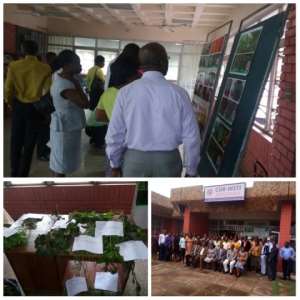
By D.I. Laary/Elsie Appiah, GNA
Accra, Oct. 20, GNA - The Forestry Research Institute of Ghana (FORIG) has called for the introduction of a legal regime to protect 'indigenous knowledge' on foods and medicinal plants from extinction and use them as the catalyst to drive rural development.
The Institute said home-grown knowledge formed the basis for local level decision making in agriculture, human and animal health, food security, education, natural resource management and must be protected.
It, therefore, urged policymakers to launch pragmatic steps to prevent local knowledge particularly on food and medicinal plant species from fading away by collecting, processing, digitising and storing the information for posterity.
A group of agricultural scientists from the FORIG, with the backing of Scientific and Industrial Research (CSIR) made the call on Wednesday during a sensitization workshop.
The meeting was organised to highlight a survey outcome which was carried out in parts of the country on plant species as part of a two-year project on, 'Digitisation of indigenous knowledge in the forestry sector in Ghana.'
'This study opened up significant gaps in the processing of indigenous knowledge in Ghana with special reference to forest food and medicines,' said Mrs Margaret Sraku-Lartey, the Project Leader.
'There is no international consensus about how indigenous peoples' rights on the protection of their cultural knowledge systems can be secured legally, promoted ethically and used resourcefully.'
'So far no legislative instrument has been identified in Ghana's laws concerning the management of indigenous knowledge.'
According to the scientists 289 species of plants were identified and recorded out which 43 were recognised as food, 199 medicines and 47 seen to have properties of both food and medicines.
'A policy on local indigenous knowledge must be developed in Ghana to cover agricultural sector - improvement of indigenous agricultural technologies, use of soil improving techniques,' FORIG officials said in a background to the study.
Dr Victor Agyemang, the Director-General of CSIR, lauded CSIR-FORIG for its efforts in addressing the indigenous knowledge gap, and urged the researchers to work effectively towards the perpetuation of local knowledge.
But such efforts, he said, required a lot of negotiations and agreements between government and stakeholders since local knowledge itself embodied all forms of experiences and way of life of the people.
"We need as a country to sit down and discuss policies that protect indigenous knowledge- we must identify, collect, store and have ideas that protects indigenous knowledge."
"It is also necessary for government to enact laws that will protect people and indigenous knowledge in the country.'
Dr Agyemang urged participants to come out with guidelines and practical solutions that would broadly protect indigenous knowledge and safeguard it through the change of attitudes.
Indigenous knowledge is very critical in the foundation of modern science and needs to be accorded the expected attention, Dr Godfred Frempong, the Deputy Director of STEPRI, said.
"It is very important that we use modern knowledge to be able to store, retrieve and transfer knowledge for the use of future generations, 'he added.
Dr Joel Sam, the Director of INSTI, expressed happiness at the efforts by researchers in an attempt to address issues confronting traditional knowledge.
He urged members of the FORIG, research team and participants to collect information on traditional experiences as well as digitise and disseminate such information accurately.
The project, which is supported by Elsevier Foundation CSIR-Forestry Research Institute of Ghana, started in January 2015 and is expected to end in December this year.
Indigenous knowledge has been described as a valuable resource used by many developed countries to fuel the multi-billion-dollar genetics supply industry.
GNA




 We’ll protect state wealth from opaque deals – Prof Jane Naana
We’ll protect state wealth from opaque deals – Prof Jane Naana
 Mauritania president says running for second term in June polls
Mauritania president says running for second term in June polls
 I won't ever say I was a mere driver’s mate' — Prof. Opoku-Agyemang
I won't ever say I was a mere driver’s mate' — Prof. Opoku-Agyemang
 2024 polls: 'EC struggling to defend credibility'— Prof. Opoku-Agyemang
2024 polls: 'EC struggling to defend credibility'— Prof. Opoku-Agyemang
 Akufo-Addo gov't's 'greed, unbridled arrogance, unrestrained impunity, sheer dis...
Akufo-Addo gov't's 'greed, unbridled arrogance, unrestrained impunity, sheer dis...
 Election 2024: Ghana needs an urgent reset, a leadership that is inspiring – Ma...
Election 2024: Ghana needs an urgent reset, a leadership that is inspiring – Ma...
 Partner NDC to rollout a future of limitless prospects – Prof Jane Naana Opoku-A...
Partner NDC to rollout a future of limitless prospects – Prof Jane Naana Opoku-A...
 NPP will remain in gov’t till Jesus comes — Diana Asamoah
NPP will remain in gov’t till Jesus comes — Diana Asamoah
 Sunyani Technical University demands apology from former SRC president over sex-...
Sunyani Technical University demands apology from former SRC president over sex-...
 'Dumsor' was resolved by Mahama but ‘incompetent' Akufo-Addo has destroyed the g...
'Dumsor' was resolved by Mahama but ‘incompetent' Akufo-Addo has destroyed the g...
